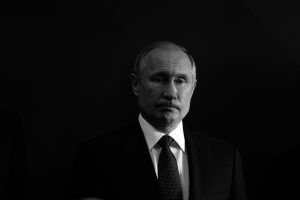
AI’s broad impact in security and politics necessitates careful management; decision-makers must navigate this transformation effectively.
December 12, 2023

In 1964, sci-fi writer and futurist Arthur C. Clarke gave his guesses on the future in a monologue to the BBC. As time and technology progressed, these guesses turned out to be prophetic predictions by their nature. Among his guesses, he defended that “The most intelligent inhabitants of the future world won’t be men or monkeys; they’ll be machines. Clarke believed that the emergence of AI would bring an end to the world of homo sapiens as we know it. Not as a doom-bringer, though. To Clarke, the machines outsmarting their makers would begin the next step of evolution: the end of the organic one and continuation through the mechanical one.
Developments in AI technology have already made it clear to us that the potential change it will be introducing to our world. International security and politics are no exception to becoming subject to this incoming change. It would be fitting to define AI as a Major Disruptive Technology (MDT) regarding the scale of its potential impact since it is much closer to the Dreadnoughts or Intercontinental Ballistic Missiles (ICBM) of the past eras when compared to drones or hypersonic systems because AI has the potential to shake the fundamentals of the power in international politics and security in addition to the battlefield, just like its predecessors in the Cold War era or 20th Century.
However, in addition to the similarities with the predecessor MDTs, AI also has a distinctive trait that may impact international security in a different nature when compared to the former two MDTs.
The question of how AI will affect security is already roaming among various circles. To understand what might be awaiting us, studying how the other MDTs have shaped the world can be a good starting point. Assessing some echoing similarities and contrasting differences within the nature of the AI as an MDT among its predecessors will shed light on the uncertainty on the horizon.
AI as a new arms race:
The main strength of AI comes from its ability to absorb vast amounts of information and process it into knowledge on a superhuman level in both speed and scale. In addition to its advanced computation capabilities, AI is a far more versatile instrument than its predecessors as an MDT. Perhaps even calling AI an “instrument” could be faulty because of its fundamentals as a technology.
Throughout our existence, human technology consisted of our brains, fire and sharp sticks. While ICBMs and Dreadnoughts fall into the category of sharp sticks, AI is an improvement in the same category based on our brains. There are various definitions for intelligence without a common consensus, which is a controversial debate on its own. If we make a simple definition based on commonalities among the existing definitions for practicality’s sake, we can call intelligence a “set of tools”.
“A very general mental capability that, among other things, involves the ability to reason, plan, solve problems, think abstractly, comprehend complex ideas, learn quickly and learn from experience. It is not merely book learning, a narrow academic skill, or test-taking smarts. Rather, it reflects a broader and deeper capability for comprehending our surroundings—”catching on,” “making sense” of things, or “figuring out” what to do”.
In this sense, AI could be considered a toolbox to upgrade a toolbox by having versatility and increased efficiency similar to the mental instruments of humans. In terms of security, AI can become a capability in numerous areas. The computational capabilities of AI carry considerable potential in monitoring and ensuring the security of critical infrastructures. The same advantages are also applicable to the operation of unmanned systems, data processing and analysis on mass scales, the contribution to decision-making mechanisms and the creation of new battle doctrines. Detailed exploration of the use of AI in fields, as mentioned earlier, is enough to become the subject of a study on its own.
However, it would be safe to say that the deployment of AI into these fields will provide an element of advantage for the implementors. And when an aspect of advantage is in question, there’s a race to make the most of it.
As an MDT, AI is in a slightly different position than its predecessors:
On the other hand, as we mentioned, these advantages will be crucial in carrying out security policies and pursuing political agendas. In this sense, AI’s implementation in the security field and politics may have some resemblance to its predecessors in its essence. What these technologies did was shape the policies and methods around themselves. Yet, the fundamentals of international politics and its power dynamics changed a little, whether it be the gunboat diplomacy of the dreadnoughts or the balance of terror of the ICBMs. On the other hand, one aspect of AI technology distinguishes itself from the predecessor MDTs, giving it the potential to influence the fundamentals of power and politics mentioned above.
Unlike other MDTs, AI directly interacts with individuals on a much broader and deeper scale (even more profound than the psychological effects of the nuclear scare and the indoctrination caused by the policies of the era). Unlike Dreadnought battleships and nuclear warheads, AI is not exclusive to state access; it is a technology that directly interacts and even gets accessed by the private sector and individuals as well. Whether it be for marketing purposes to promote the sales of a product or a student getting help on their thesis, AI is getting more and more involved in our lives (just like personal computers and smartphones). As it gets more involved in our lives, it will inevitably start changing human thought, perception and reality as well, bringing its own challenges and risks along the way.
To contemplate what those risks could be, taking a glance at security risks and challenges emerging from the recent developments of generative AI systems like ChatGPT and Claude is a start. Generative AI is considered to be a sort of gateway to a new horizon -perhaps the greatest since the Age of Enlightenment- for humanity. However, as the modus operandi of AI gets further away from human reason and understanding, the more significant cognitive disorientation caused by the gap increases. Addressing this gap will make providing effective measures against AI’s challenges feasible.
Generative AI models already proved to be capable of fabricating false knowledge in such a convincing way. This already shows the harmful potential of AI to be used for disinformation and manipıulation of the masses. This potential gets amplified, posing even greater threat in a spreading climate of “Truth Decay”.5 Another concern regarding generative AI is that it can be capable of causing atrophy in human critical thinking and creativity which is also capable of breeding even more significant consequences. Generative AI is only a portion of the whole technology. But even that portion’s potential is enough to prove the weight this new technology will have on the evolution of human civilisation.
A new, broader and deeper approach will be required:
Despite the uncertainties, it is clear that AI will have a huge role in the destination humanity is heading towards. With its interaction and influence, starting from individuals and spreading to the whole of society and its decision-makers, AI will be influencing the way we conduct our politics. When this becomes the case, the relationship between humans and the dynamics of power can have some definitive shifts in its structure. In a world where new fundamentals of power are introduced, new approaches to national and international security will be necessary.
While recent developments in AI technology could be frighteningly disorienting, and the potential change accompanying it introduces existential concerns, by wielding an effective and innovative approach, decision-makers and policymakers could respond by taking effective steps to ensure that AI develops on a safe path.
A curated seletion of FA’s must-read stories.
Written By: DILARA SAHIN
Written By: RIZWAN RAFI TOGOO
Written By: ERIC SONG
Written By: BATUHAN GUNES
Written By: E. ERDEN
Written By: SHOHREH POOLAB
Written By: ALEYNA TASTAN
Written By: CIHAN KAAN GAZI

Kerem Karaçay is an International Relations graduate from Kadir Has University in Istanbul, Turkey. During his study years, he simultaneously worked as an Intern at The Centre for Economics and Foreign Policy Studies (EDAM). In these years, he shifted his focus to international security studies. In addition to security studies, he conducts public diplomacy activities within the YATA network, which he has been an active board member of since 2018 and a member of the Turkish Atlantic Council. He served in YATA Turkey as an Executive Vice President and Vice President of Finance in the past, and currently, he is serving his second term as the latter. He is currently working on a study regarding Artificial Intelligence and its potential impacts on International Security and contemporary warfare. His main focus areas include International Politics, Security Studies, U.S. Politics and Foreign Policy, Chinese Foreign Policy, Chaos Theory, Quantum Computing, Artificial Intelligence, Open Source Intelligence, Computational International Relations Studies, and Counter-Terrorism Studies.
Written By: GABRIEL RAMIREZ
Written By: DILARA SAHIN
Written By: DILRUBA YILMAZ
Written By: NILAY CELIK
Written By: ELDANIZ GUSSEINOV
Written By: JOSEF SCHOEFL
Written By: SELCAN BEDIRHANOGLU
Written By: FATIH CEYLAN
FA’s flagship evening newsletter guilding you through the most important world streis ofthe day. Delivered weekdays.
